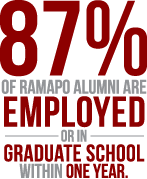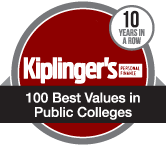College Catalog: 2010-2011
School of Theoretical and Applied Science (TAS): Allied Health Technologies (B.S.)
Website: School of Theoretical and Applied Science
Convener:
This program is jointly offered by Ramapo College of New Jersey and the University of Medicine and Dentistry of New Jersey – School of Health Related Professions (UMDNJ-SHRP). Our Allied Health Technologies major is designed for students who would like to train in the fields of diagnostic medical sonography, nuclear medicine technology, respiratory care or vascular technology. These health care professionals will be trained to work alongside physicians and other professionals in the diagnosis and care of patients.
Students must complete 96 credits, including General Education requirements, School of Theoretical and Applied Science requirements, and a preprofessional core. They then can be admitted to a professional program at UMDNJ-SHRP. The Allied Health professional program consists of 3-4 academic semesters (up to 18 months) of full time study in one of four areas of specialization. Upon completion, students receive a joint B.S. Degree from UMDNJ and Ramapo College, and qualify to declare a minor in Biology.
Concentrations in:
Diagnostic Medical Sonography
Sonographers are highly skilled professionals qualified by education to provide patient services using diagnostic techniques under the supervision of a licensed Doctor of Medicine or Osteopathy. Diagnostic medical sonography includes general sonography, cardiac sonography, vascular technology, and various subspecialties.
Respiratory Care
Respiratory therapists are health care specialists who participate in the diagnosis, treatment, management, education, and preventive care of patients with disorders of the cardiopulmonary system. Some of their primary responsibilities include medical gas therapy, humidification and aerosol therapy, drug administration, bronchial hygiene therapy, cardiopulmonary resuscitation, maintenance of artificial airways, and ventilator management.
Nuclear Medicine Technology
Nuclear Medicine is a medical specialty that uses radioactive materials for the diagnosis and treatment of disease. They are specifically trained in radiation safety, laboratory techniques, imaging procedures, and the use of highly specialized equipment to assure the efficient daily operation of their facility.
Vascular Technology
Vascular technologists use state-of-the-art ultrasound equipment and other forms of non-invasive testing to detect the presence of arterial diseases that can cause stroke, renal failure, gangrene, amputation, and aortic aneurysms and of life-threatening venous diseases that can lead to pulmonary embolism or morbid conditions caused by blood clots, varicose veins, and non-healing ulcerations.
- Transfer students who have 48 or more credits accepted at the time of transfer are waived from the courses marked with a (W) below. Waivers only apply to General Education Requirements NOT School Core or Major Requirements.
- Double counting between General Education, School Core, and Major may be possible. Check with your advisor to see if any apply.
- Subject & Course # – Title & Course Description
- GENERAL EDUCATION REQUIREMENTS
- INTD 101 - FIRST YEAR SEMINAR (W)
- ENGL 180 - COLLEGE ENGLISH
- SELECT ONE – BADM 115 - PERSPECTIVES OF BUSINESS AND SOCIETY (W) OR
- SOSC 101 - SOCIAL ISSUES (W)
- SELECT ONE – (W) GE-HISTORY CATEGORY: HIST 101-110
- AIID 201 - READINGS IN HUMANITIES (W)
- SELECT ONE – GE-INTERCULTURAL NORTH AMERICA CATEGORY
- SELECT ONE – GE-INTERNATIONAL ISSUES CATEGORY
- SELECT ONE – (W) GE-TOPICS ARTS AND HUMANITIES CATEGORY OR
- (W) GE-TOPICS SOCIAL SCIENCE CATEGORY
- SCHOOL OF THEORETICAL AND APPLIED SCIENCE REQUIREMENT
- SELECT ONE – Science In Cultural Perspective course list *:
- AMER 307 - TECHNOLOGY AND CULTURE IN AMERICA
- ANTH 307 - MEDICAL ANTHROPOLOGY
- CNTP 315 - ART ON THE INTERNET
- COMM 307 - ENVIRONMENTAL WRITING
- ENST 215 - ENVIRONMENTAL HISTORY
- ENST 223 - ENERGY AND SOCIETY
- ENST 305 - ECOLOGY, ECONOMICS AND ETHICS
- ENST 312 - ECOLOGICAL ANTHROPOLOGY
- ENST 317 - ENVIRONMENTAL POLICY AND REGULATION
- HIST 396 - HISTORY OF SCIENTIFIC IDEAS
- INFO 315 - COMPUTER LAW AND ETHICS
- LAWS 390 - TOPICS:
- MATH 441 - HISTORY OF MATH
- MGMT 324 - INVENTION FOR MANAGERS AND SCI
- PHIL 328 - BIOETHICS
- PSYC 306 - ETHICAL AND LEGAL ISSUES
- PSYC 423 - HISTORY AND SYSTEMS OF PSYCHOLOGY
- SCIN 210 - SCIENCE, TECHNOLOGY, AND SOCIETY
- SCIN 230 - COMPUTERS AND SOCIETY
- SCIN 235 - HISTORICAL TRENDS IN NURSING
- SCIN 346 - SURVEY OF SCIENCE FICTION
- SCIN 434 - WOMEN AND SCIENCE
- SCIN 435 - WRITING ABOUT SCIENCE FOR PUBLIC MEDIA
- * Please consult the School of TAS for the currently active courses which meet the SCP requirement.
- ALLIED HEALTH TECHNOLOGIES MAJOR REQUIREMENTS
Pre -Professional Core Requirements - BIOL 110 - FUNDAMENTALS OF BIOLOGY I: LECTURE AND LAB
- BIOL 112 - FUNDAMENTALS OF BIOLOGY II: LECTURE AND LAB
- BIOL 213 - ANATOMY AND PHYSIOLOGY I: LECTURE AND LAB
- BIOL 215 - ANATOMY AND PHYSIOLOGY II: LECTURE AND LAB
- BIOL 331 - GENETICS: LECTURE AND LAB
- BIOL 406 - CELL AND MOLECULAR BIOLOGY: LECTURE AND LAB* OR
- CHEM 425 - BIOCHEMISTRY*
- CHEM 110 - FUNDAMENTALS OF CHEMISTRY I: LECTURE AND LAB
- CHEM 112 - FUNDAMENTALS OF CHEMISTRY II: LECTURE AND LAB
- CHEM 210 - ORGANIC CHEMISTRY I: LECTURE AND LAB
- MATH 110 - PRECALCULUS or
- MATH 121 - CALCULUS I
- PHYS 101 - PHYSICS FOR NON-SCIENTSTS OR
- PHYS 110 - FUNDAMENTALS OF PHYSICS I: LECTURE AND LAB OR
- PHYS 114 - PHYSICS I WITH CALCULUS: LECTURE AND LAB
- PSYC 242 - STATISTICS
- SELECT ONE – BIOLOGY ELECTIVE COURSE
- Professional courses at UMDNJ: 45-54 crs
- Note: SEE ADVISOR IN SCHOOL OF THEORETICAL AND APPLIED SCIENCE
- * Note: While Organic Chemistry II is not required for the major, it is a prerequisite for both Biochemistry and Cell and Molecular Biology. However, since it is not a required course, students can select to take a Pass/Fail or no credit.
Note: A 2.0 GPA in the major is required for graduation.
General Education Requirements
Graduation Requirements
School of Theoretical and Applied Science Website
Faculty Profiles






